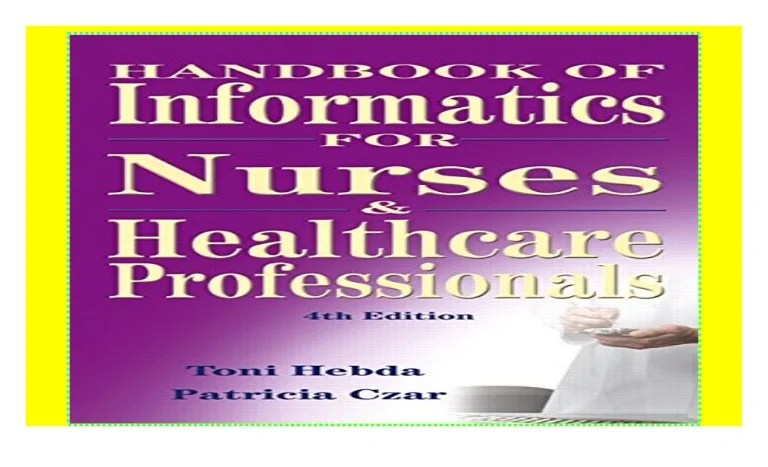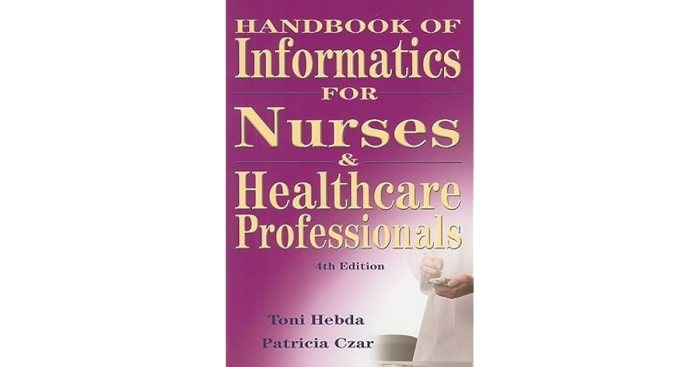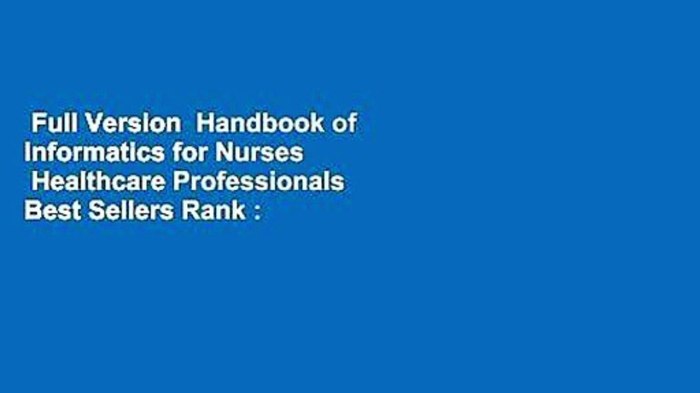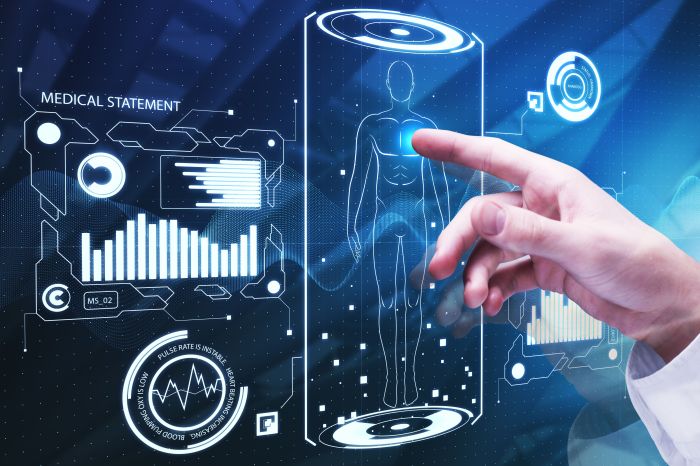The Handbook of Informatics for Nurses & Healthcare Professionals PDF is an essential resource for nurses and other healthcare professionals seeking to harness the power of informatics to improve patient care and optimize healthcare delivery. This comprehensive guide provides a thorough overview of key informatics concepts, applications, and ethical considerations, empowering nurses to navigate the rapidly evolving landscape of healthcare technology.
Informatics plays a pivotal role in modern healthcare, enabling the collection, analysis, and dissemination of data to inform decision-making, enhance patient outcomes, and streamline healthcare processes. This handbook equips nurses with the knowledge and skills necessary to leverage informatics tools and technologies to improve patient care, increase efficiency, and enhance collaboration within the healthcare team.
1. Introduction
The Handbook of Informatics for Nurses & Healthcare Professionals provides a comprehensive overview of the field of healthcare informatics, including its history, key concepts, applications, and ethical and legal considerations. This handbook is intended for nurses and other healthcare professionals who are interested in learning more about informatics and how it can be used to improve patient care.
Informatics is the science of information and its use in healthcare. It is a rapidly growing field that is transforming the way healthcare is delivered. Informatics tools and technologies can be used to improve patient safety, quality of care, and efficiency.
They can also help nurses and other healthcare professionals to make better decisions and to provide more personalized care to their patients.
2. Informatics Concepts
Informatics is a broad field that encompasses a wide range of concepts. Some of the key concepts in informatics include:
- Data: Data is the raw material of informatics. It can be anything from a patient’s vital signs to a doctor’s notes.
- Information: Information is data that has been processed and organized so that it can be used to make decisions. For example, a doctor might use a patient’s vital signs to make a diagnosis.
- Knowledge: Knowledge is information that has been interpreted and applied to a specific situation. For example, a doctor might use their knowledge of a patient’s diagnosis to develop a treatment plan.
Technology plays a vital role in healthcare informatics. Informatics tools and technologies can be used to collect, store, process, and analyze data. They can also be used to communicate information between healthcare professionals and patients.
3. Nursing Informatics

Nursing informatics is the application of informatics to nursing practice. Nurses play a vital role in healthcare informatics. They are responsible for collecting, managing, and using data to improve patient care. Nurses also use informatics tools and technologies to communicate with other healthcare professionals and patients.
There are many benefits to using informatics in nursing practice. Some of these benefits include:
- Improved patient safety: Informatics tools and technologies can help nurses to identify and prevent errors.
- Improved quality of care: Informatics can help nurses to provide more personalized and effective care to their patients.
- Increased efficiency: Informatics tools and technologies can help nurses to work more efficiently.
4. Healthcare Informatics Applications

Informatics is used in a wide range of healthcare settings. Some of the most common applications of informatics in healthcare include:
- Electronic health records (EHRs): EHRs are digital records that contain a patient’s medical history, including their vital signs, medications, and allergies.
- Computerized provider order entry (CPOE): CPOE systems allow doctors to enter orders for medications, tests, and other services directly into a computer.
- Telemedicine: Telemedicine is the use of technology to provide healthcare services remotely.
- Decision support systems: Decision support systems are computer programs that help healthcare professionals to make decisions about patient care.
Informatics is a powerful tool that can be used to improve the quality, safety, and efficiency of healthcare. As the field of informatics continues to grow, we can expect to see even more innovative and groundbreaking applications of informatics in healthcare.
5. Ethical and Legal Considerations: Handbook Of Informatics For Nurses & Healthcare Professionals Pdf

The use of informatics in healthcare raises a number of ethical and legal considerations. Some of the most important ethical and legal considerations include:
- Privacy: Informatics systems contain a wealth of personal information about patients. It is important to protect this information from unauthorized access and use.
- Security: Informatics systems must be secure to protect patient information from unauthorized access and use.
- Confidentiality: Healthcare professionals have a duty to keep patient information confidential. This duty extends to the use of informatics systems.
- Informed consent: Patients have the right to know how their information will be used before it is collected or used.
Healthcare professionals must be aware of the ethical and legal considerations related to the use of informatics. By following these guidelines, healthcare professionals can help to protect patient privacy and ensure that informatics is used in a responsible and ethical manner.
6. Future of Healthcare Informatics

The future of healthcare informatics is bright. As the field of informatics continues to grow, we can expect to see even more innovative and groundbreaking applications of informatics in healthcare. Some of the most promising areas of research in healthcare informatics include:
- Artificial intelligence (AI): AI is a branch of computer science that deals with the creation of intelligent machines. AI has the potential to revolutionize healthcare informatics by automating tasks, improving decision-making, and providing personalized care.
- Blockchain: Blockchain is a distributed database that is used to record transactions. Blockchain has the potential to improve the security and privacy of healthcare informatics systems.
- Internet of Things (IoT): IoT refers to the network of physical devices that are connected to the internet. IoT devices have the potential to collect a wealth of data that can be used to improve healthcare informatics.
These are just a few of the many promising areas of research in healthcare informatics. As the field of informatics continues to grow, we can expect to see even more innovative and groundbreaking applications of informatics in healthcare.
FAQ Section
What is the purpose of the Handbook of Informatics for Nurses & Healthcare Professionals PDF?
The Handbook of Informatics for Nurses & Healthcare Professionals PDF provides a comprehensive overview of informatics concepts, applications, and ethical considerations to empower nurses and other healthcare professionals to leverage technology to improve patient care and healthcare delivery.
What are the key topics covered in the handbook?
The handbook covers a wide range of topics, including informatics concepts, the role of technology in healthcare informatics, nursing informatics, healthcare informatics applications, ethical and legal considerations, and the future of healthcare informatics.
Who is the target audience for the handbook?
The handbook is intended for nurses and other healthcare professionals who are interested in learning more about informatics and its applications in healthcare.